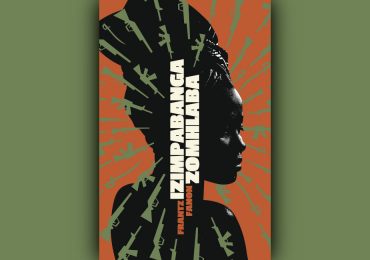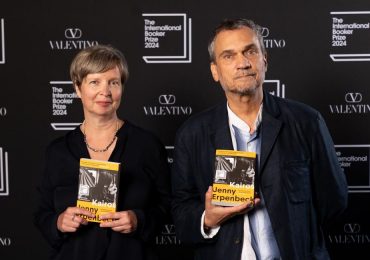City Editor Niq Mhlongo finds a cautionary tale in an interaction with one of his (heretofore unknown) international publishers.
In January this year, a friend of mine sent me a message of congratulation from Yangon, the capital city of Myanmar (formerly Burma). According to her message, she had been walking on the streets of Yangon when she saw some copies of my book Dog Eat Dog for sale. It had been translated into Burmese. Excited for me, my friend posted the message and a photo of the book, along with a Burmese translation of Trevor Noah’s memoir Born a Crime, on my Facebook wall. Many of my other Facebook friends saw the post and started showering me with praise. They told me how happy they were for me and how they wished the book could also be translated into other South African languages. Some even rightly mentioned that Dog Eat Dog, which was published in 2014, was the first novel to talk about the issues that would be formalised in the Fees Must Fall movement.
I was overwhelmed by these accolades, but didn’t know how to respond. My concern was that I was not aware of this Burmese translation. It was the first I had heard of it. The only translations of the book that I was aware of were in Italian and Spanish.
The first thing I did was to contact my publisher, Kwela, to ask if they were aware of the Burmese translation. I also sent them the image of the books, which had the logo of NDSP Publishers on them. Kwela were also not aware of the translation, and promised to follow it up. Meanwhile, I started receiving messages from students and scholars in Burma. About six of these messages were from people asking me questions about Dog Eat Dog, as they claimed to be studying is for a course on ‘African literature, South African Literature, and comparative literature’. They all claimed to have read and loved the book.
Two months passed. Then, about two weeks ago, a South African friend of mine called me to say he had met my Burmese publisher, San Mon Aung. I was introduced to him, for the first time, and Aung and I started communicating through a series of emails. One of the emails said:
I published a lot of translation books. In Myanmar, we are not under the international copyright law umbrella and most of the Myanmar publishers do not concern to get translation right when they publish. But I always try to get to get the translations right when I publish. Sometimes, lack of information or I couldn’t reach the right holder and difficult to contact. I published your wonderful book called Dog Eat Dog without your knowledge. I deeply sorry and felt guilty about it. I published one thousand copies with 2.5 Dollars for retail price. Indeed, publishing industry in Myanmar is not very good business, but we sold all the copies. I can say that book is a bestseller book. I got a good review from Myanmar readers because most political issues in your book and our country current situation is totally the same.
I didn’t know what to say to Aung, but I acknowledged his openness. He even suggested future collaborations. For me, however, his activities represented lost income. It always feels great to be translated and read across the world, but without a contract, my labour is free, and so the translation does not pay the bills. This, then, is something I cannot celebrate or happily talk about. It also makes it difficult for me to engage with scholars from Burma, which is a pity as many feel the book contributes to their literary landscape.
By coincidence, this saga happened at the same time as the ongoing discussion around the Copyright Amendment Bill in South Africa. Recently, a coalition of artists, writers and publishers wrote to Trade and Industry Minister Rob Davies to challenge the Bill, calling it potentially ‘devastating’ to the creative industry. Before we go any further, I must say that I’m not closely familiar with what this Bill entails. So far, I have what you could call a pedestrian understanding that it is good for some artists but bad for others. In trying to help me understand, a friend gave me the simple explanation that some artists will benefit, but the majority will not. The main concerns for writers have to do with the redefinition and expansion of the idea of ‘fair use’ of texts, and the impact on academic publishing. According to an impact assessment undertaken by PricewaterhouseCoopers for the Publishers’ Association of South Africa (PASA), the publishing industry expects an average decline in sales of 33 per cent, implying a decrease in sales revenue of approximately R2.1 billion, and a decline in employment of 30 per cent, equating to around 1,250 full-time jobs. The report adds that its findings correlate with was has actually happened in other countries that amended their copyright laws.
I’m concerned about what could happen to some writers and artists in South Africa if the Copyright Amendment Bill goes through. If the Bill is signed into law, people will be able to republish parts of my work without getting permission. I may not be compensated financially for my work. Like many South Africans, I’m not full-time employed at the moment, and I rely on my freelance jobs and my writing for survival. For example, some chapters from Dog Eat Dog are included in the English curriculum for grade 10 (excerpted in the English for Life Grade 10 Home Language Learner Book). I get paid royalties for this twice a year. If the Bill becomes an Act, this might fall away. The Bill seeks to improve access to educational material, but to me this becomes ‘expropriating my words without compensation’. Needless to say, I have joined forces with other artists to have it annulled.
Kwela’s investigation into the Burmese edition of my book has reached an impasse; it seems there is nothing they can do about it. Closer to home, it would be nice to be assured that my fellow writers and I will continue to be fairly compensated for our hard work.
- Niq Mhlongo is The JRB City Editor. His latest book is an anthology of short stories, Soweto, Under the Apricot Tree. Follow him on Twitter.






2 thoughts on “[City Editor] Finding out you’re big in Myanmar—and a caution on the potential effects of South Africa’s Copyright Amendment Bill”